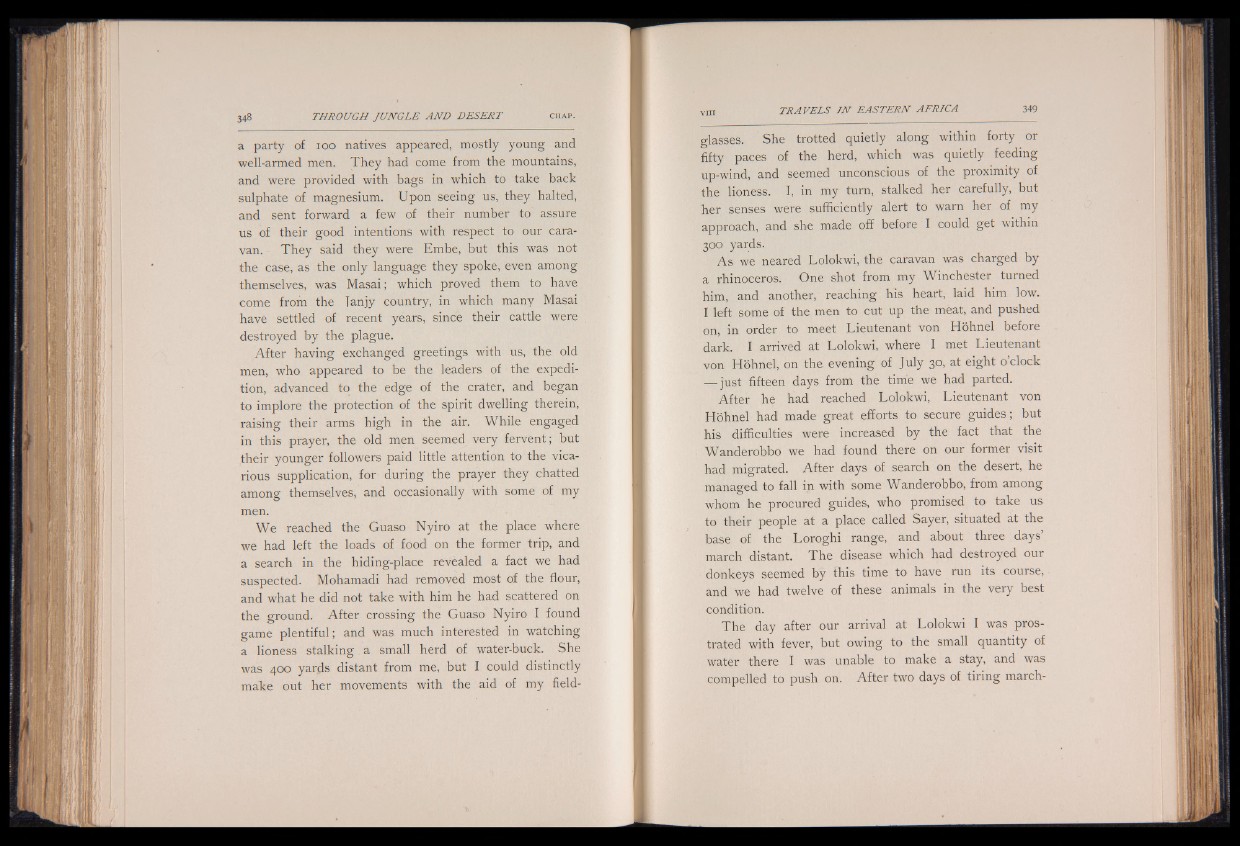
a party of 100 natives appeared, mostly young and
well-armed men. They had come from the mountains,
and were provided with bags in which to take back
sulphate of magnesium. Upon seeing us, they halted,
and sent forward a few of their number to assure
us of their good intentions with respect to our caravan.
They said they were Embe, but this was not
the case, as the only language they spoke, even among
themselves, was Masai; which proved them to have
come from the Janjy country, in which many Masai
have settled of recent years, since their cattle were
destroyed by the plague.
After having exchanged greetings with us, the old
men, who appeared to be the leaders of the expedition,
advanced to the edge of the crater, and began
to implore the protection of the spirit dwelling therein,
raising their arms high in the air. While engaged
in this prayer, the old men seemed very fervent; but
their younger followers paid little attention to the vicarious
supplication, for during the prayer they chatted
among themselves, and occasionally with some of my
men.
We reached the Guaso Nyiro at the place where
we had left the loads of food on the former trip, and
a search in the hiding-place revealed a fact we had
suspected. Mohamadi had removed most of the flour,
and what he did not take with him he had scattered on
the ground. After crossing the Guaso Nyiro I found
game plentiful; and was much interested in watching
a lioness stalking a small herd of water-buck. She
was 400 yards distant from me, but I could distinctly
make out her movements with the aid of my fieldglasses.
She trotted quietly along within forty or
fifty paces of the herd, which was quietly feeding
up-wind, and seemed unconscious of the proximity of
the lioness. I, in my turn, stalked her carefully, but
her senses were sufficiently alert to warn her of my
approach, and she made off before I could get within
300 yards.
As we neared Lolokwi, the caravan was charged by
a rhinoceros. One shot from my Winchester turned
him, and another, reaching his heart, laid him low.
I left some of the men to cut up the meat, and pushed
on, in order to meet Lieutenant von Hohnel before
dark. I arrived at Lolokwi, where I met Lieutenant
von Hohnel, on the evening of July 30, at eight o’clock
— just fifteen days from the time we had parted.
After he had reached Lolokwi, Lieutenant von
Hohnel had made great efforts to secure guides; but
his difficulties were increased by the fact that the
Wanderobbo we had found there on our former visit
had migrated. After days of search on the desert, he
managed to fall in with some Wanderobbo, from among
whom he procured guides, who promised to take us
to their people at a place called Sayer, situated at the
base of the Loroghi range, and about three days’
march distant. The disease which had destroyed our
donkeys seemed by this time to have run its course,
and we had twelve of these animals in the very best
condition.
The day after our arrival at Lolokwi I was prostrated
with fever, but owing to the small quantity of
water there I was unable to make a stay, and was
compelled to push on. After two days of tiring march